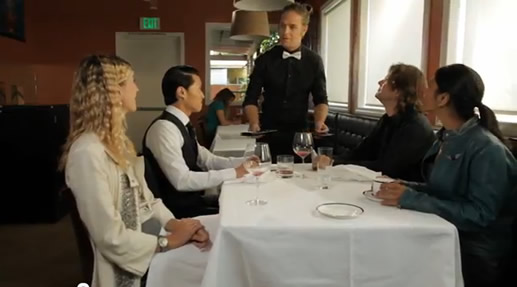Space Tourists vs. Future Farmers
Saturday, February 18th, 2012: Odds & Ends, Society.
Taking the sporadic glance at my junk mail folder, I discovered that I’m on the self-promotion mailing list of the ex-girlfriend of an old pal. The ex-GF is a former self-styled internet “product evangelist” who has now elevated herself to the role of “futurist” and philosopher. She proudly proclaims herself a member of an international network of young futurists, many of them university-educated in “future studies.” The email linked to a recently completed video commercial based on her work.

In the slick commercial, four fashionably dressed young urban professionals are finishing a meal in a generic-looking upscale restaurant. One woman enthusiastically describes her recent trip to space. The waiter arrives with a handheld electronic bill/scanner device, and our yuppies proceed to divide up the price items in futuristically convenient ways, paying with various forms of scannable credit, including credits toward space flight. The implication is that technology is giving young urban professionals more personal freedom, including of course the freedom to travel in space.
But not all of us are yuppies. Human life doesn’t reach its full potential in the sanitized context of spacecraft or upscale urban bistros, and electronic credit is ultimately only a symbol which disguises our dependence on physical resources that are extracted from earthly ecosystems by rural communities. The freedom of the ex-GF’s “integrated mobile payments, credit cards, private coins and corporate space currency” is also the freedom from having to grow your own food, build your own shelter, make your own clothes, chop your own firewood. And this personal freedom, sometimes more patriotically termed “liberty,” is also a dependence on the labors of the rural providers, and an exploitation of them by means of a market economy that remotely, and unaccountably, manipulates their labors and their natural resources.
For a more balanced and realistic take on space travel, check out the poignant but even-handed 2009 documentary film Space Tourists, which shows an American billionaire enjoying her trip to the International Space Station on a Russian rocket, while peasants, out herding their flocks on the steppe below, collect discarded rocket parts to use as temporary shelter from the earthly elements.
I had my own fling with futurism as a teenage science fiction fan. What it all boils down to is adolescent insecurity – a craving for power and speed; adolescent rebellion – a need to distinguish yourself from your elders; and a fear of death resulting from urban society’s avoidance and denial of the role of death in the community and ecosystem. The primary themes of futurism are space travel, immortality, and a continual increase in personal power and convenience through technological progress. Any social or ecological consequences of these personal advantages can presumably be solved through engineering, in the same way that Nazism gave us the master race and nuclear power gave us unlimited cheap energy.
In the language of the Occupy movement, futurism is for the 1%. But statistics can be made to tell any story. The 99% is supposed to stand for the rest of us who are not rich, but one thing most of us have in common with the rich is that we’re primarily consumers of resources originally produced by rural farmers and miners under perennially exploitative conditions. And I’m not talking about Apple’s factory workers in China, who are also primarily consumers striving to increase their “quality of life,” meaning increased consumption of manufactured goods. You can reverse the Occupy statistics to observe that in today’s unsustainable human ecology, rural providers are the 1% exploited by the rest of us.
For the ex-GF, the future means perpetually young, fashionable, affluent urban consumers taking vacations in space. For this recovered futurist, the future is today, where, in my rural community far from the exaggerated consumer dreams and temptations of the city, young farmers and parents grow food for their neighbors and help raise each other’s children to become healthy providers for the next generation.



Leaving earth for good is a worthwhile pursuit. Traveling to orbit just to be able to tell your friends is, well, typical.